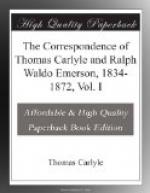Concord, 13 September, 1837
My Dear Friend,—Such a gift as the French Revolution demanded a speedier acknowledgment. But you mountaineers that can scale Andes before breakfast for an airing have no measures for the performance of lowlanders and valetudinarians. I am ashamed to think, and will not tell, what little things have kept me silent.
The French Revolution did not reach me until three weeks ago, having had at least two long pauses by the way, as I find, since landing. Between many visits received, and some literary haranguing done, I have read two volumes and half the third and I think you a very good giant; disporting yourself with an original and vast ambition of fun: pleasure and peace not being strong enough for you, you choose to suck pain also, and teach fever and famine to dance and sing. I think you have written a wonderful book, which will last a very long time. I see that you have created a history, which the world will own to be such. You have recognized the existence of other persons than officers, and of other relations than civism. You have broken away from all books, and written a mind. It is a brave experiment, and the success is great. We have men in your story and not names merely; always men, though I may doubt sometimes whether I have the historic men. We have great facts—and selected facts—truly set down. We have always the co-presence of Humanity along with the imperfect damaged individuals. The soul’s right of wonder is still left to us; and we have righteous praise and doom awarded, assuredly without cant. Yes, comfort yourself on that particular, O ungodliest divine man! thou cantest never. Finally we have not—a dull word. Never was there a style so rapid as yours,—which no reader can outrun; and so it is for the most intelligent. I suppose nothing will astonish more than the audacious wit and cheerfulness which no tragedy and no magnitude of events can overpower or daunt. Henry VIII loved a Man, and I see with joy my bard always equal to the crisis he represents. And so I thank you for your labor, and feel that your contemporaries ought to say, All hail, Brother! live forever: not only in the great Soul which thou largely inhalest, but also as a named, person in this thy definite deed.
I will tell you more of the book when I have once got it at focal distance,—if that can ever be, and muster my objections when I am sure of their ground. I insist, of course, that it might be more simple, less Gothically efflorescent. You will say no rules for the illumination of windows can apply to the Aurora borealis. However, I find refreshment when every now and then a special fact slips into the narrative couched in sharp and businesslike terms. This character-drawing in the book is certainly admirable; the lines are ploughed furrows; but there was cake and ale before, though thou be virtuous. Clarendon surely drew sharp




